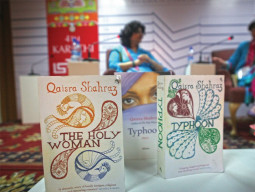
In 1905, the Indian Ladies Magazine published “Sultana’s Dream”, a science fiction story by a Bengali woman named Roquia Hossain. The protagonist falls asleep in her bedroom in the zenana ‘thinking idly of the condition of Indian womanhood’, and wakes to find herself in a utopia, where women reign and men are consigned to the mardana (purdah, inverted) so society can progress. The women of this peaceful society have removed those they consider responsible for the violence and crime they once saw around them from public life by using their wits, and their mastery of science. While the men were out making war, the Queen ordered that all the women in her domain be educated, and banned early marriages. When the men returned from their lost war, beaten and bloody, their numbers decimated, their enemy in pursuit, female scholars told them they had invented things that could save their lives, but they would need to step outside their zenanas to do it, so the men needed to step into them for the sake of ‘honour and liberty’. Tired, the men were only too happy to be given an excuse to limp obediently into the seclusion the women abandoned, clueless that it was the beginning of their own, with its attendant tasks of cooking, cleaning and minding babies.
Once the women had dispatched the invading army through an awe-inspiring — but non-violent — demonstration of harnessing energy, they set about transforming the world around them. Buildings and businesses were powered by solar energy, water gathered from clouds, and distances consumed by hydrogen and electricity powered hovercraft, thus eliminating totally the need for roads (and doubtless the associated risks of corruption in awarding contracts and too many visits from pesky neighbourhood powers). The workday lasted only two hours. That was all the time it took for women to do the tasks men used to spend seven hours doing (five of which they spent smoking and chatting).
When the dreamer asks her guide, Sara, how it is that women have so easily usurped men’s spaces and tasks when the masculine brain is bigger and heavier than the feminine, Sara replies “Yes, but what of that? An elephant also has got a bigger and heavier brain than a man has. Yet man can enchain elephants and employ them, according to their own wishes.” And when Sultana tells Sara the reason women in India still allow themselves to be shut away by men is because “it cannot be helped as they are stronger than women”, Sara says, “A lion is stronger than a man, but it does not enable him to dominate the human race. You have neglected the duty you owe to yourselves and you have lost your natural rights by shutting your eyes to your own interests”.
It is a testimonial to both the enduring power of storytelling and the sorry state of the world that “Sultana’s Dream” still has resonance and relevance. One hundred and eight years later — time enough for empires to fall, nations to rise, people to learn — we Pakistani women still find ourselves in a situation where we let decisions about our lives be taken by men. Do I exaggerate? How many women participated in the All Parties Conference to ‘evolve consensus’ on negotiations with the TTP, and how many will be part of the jirga they assemble?
Why is it that in this avowedly democratic country it is accepted that there is no such thing as equal rights? Roquia Hossain, more than a century ago, had a theory about why it is Muslim societies were slow to develop. A devout Muslim herself, she felt the principles of faith were hijacked by conservatism and patriarchy.
In “Sultana’s Dream”, these attitudes are revealed as the men initially dismiss the women’s marvellous creations as a ‘sentimental nightmare’, and later in the contrast between the notion of mehram in the time to which Sultana belongs, and the utopia Sara has led her to.”Are you not allowed to see any man, except your own relations?” asks Sultana. No, Sara replies, but their idea of “sacred relations” extends even to “distant cousins”.
In “Sultana’s Dream”, in the space between fathers and brothers and far removed cousins lies the world, the possibility of finding humanity in the distant and unknown. In our Pakistan, in that space lie sin and feuds about who owns women’s bodies. Humanity is subservient to religion, not the other way around. In “Sultana’s Dream”, Sara’s society is constructed around the worship of ‘Love and Truth’. The highest duty is to “love one another and be absolutely truthful”.
All of which are apparently much easier to do once you have put away the men and ensured the only balls you need concern yourself with are the ones powering your ingenious coptercraft.
I’m not a man hater. I’m growing two myself and, on good days, find them quite tolerable, even enchanting. But I confess there is a part of me that felt my heart lift at “Sultana’s Dream”. Perhaps, it was the passage at the end, when the Queen told Sultana “she had no objection to permitting her subjects to trade with other countries. But trade was impossible with countries where the women were kept in the zenanas and so unable to come and trade with us. Men, we find, are rather of lower morals and so we do not like dealing with them. We do not covet other people’s land, we do not fight for a piece of diamond though it may be a thousand-fold brighter than the Koh-i-Noor, nor do we grudge a ruler his Peacock Throne. We dive deep into the ocean of knowledge and try to find out the precious gems, which nature has kept in store for us. We enjoy nature’s gifts as much as we can”.
In a world like that, there is a greater chance of reaching up for a crimson fruit and finding it is, in fact, a fruit and not a child’s blood-spattered shoe.
Published in The Express Tribune, March 5th, 2013.
COMMENTS (15)
Comments are moderated and generally will be posted if they are on-topic and not abusive.
For more information, please see our Comments FAQ
































































@babar: thats because men have dominated and ruled forever and women's liberation has hardly completed a century. simple history.
And yet, all the people who have contributed to knowledge and scientific progress happen to be men.
You made your point beautifully with the use of the story.............and what a great story.
@Munawar: it is clear you missed and messed the entire concept of the article :)
Its not only men I think women also don't help other women when they are in the position to do it. Women should understand that to achieve their independence they will have to work really hard and make huge sacrifices. They will also have to understand that men and other women will not help them. Period.
That's an amazing story.
I cannot believe that someone could publish such a story in 1905. Looks like 1905 was more progressive than 2013!
@Munawar: Your comment is the display of male chauvinism . ... carry on.
@Munawar How come quoting from the story was demeaning. Overall, it was a great reading and amazing logic. It is so true that at the level of decisions of war and peace, women are absent totally, specially in pakistan. The likes of bearded and beardless mullahs sitting on these conferences and jirgas would never accept it. Not in this generation at least.
that really was quite marvelous. here's hoping women someday get a go at this running the world malarkey.
you may be right to some extent!! but the whole article is exaggerating.
Good women, anny good women, are simply unforgettable. Their memories are what make life so beautiful.
The Liberia of today comes to my mind. The country came into peace after the women shamed their men and took the reigns!
amazing